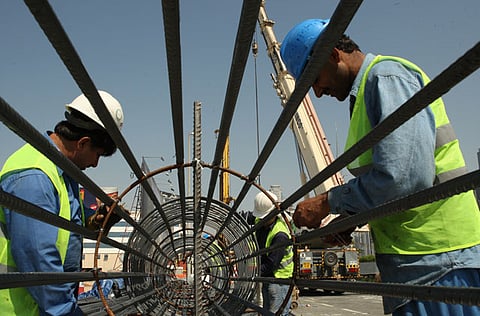UAE workers: Ramadan should be productive time
Question wisdom of reducing work hours by two hours a day

Abu Dhabi: Some workers say they are baffled as to why an eight-hour shift is reduced to six in Ramadan.
Amjad Hussain, a taxi driver from Pakistan, says he works more than 15 hours a day during Ramadan.
Hussain, whose shift starts at 6am and ends at midnight, with only an hour break at 1pm and another break for iftar between 7.30pm and 9.00pm, says history teaches us Ramadan was a time of great achievements and victories for Muslims.
Hussain said he is against reduced working hours during Ramadan and said he feels stronger and more physically fit to put in extra hours during Ramadan.
“The secret is to eat well and sleep well and one will see the difference during Ramadan,” Hussain says.
Khalid Saleh Al Zubaidi, general manager of Nasa Electricals, echoed similar sentiments and said the misrepresentation of Ramadan is shown in the actions of some Muslims who see it as an excuse to engage in unproductive habits, such as staying up all night in cafes and restaurants, resulting in being tired at work the next day.
Al Zubaidi said he does not agree with governments and businesses across the GCC catering to the needs of fasting Muslims by reducing working hours, which further emphasises that Ramadan is a “reduced workload” month, hence low productivity from employees.
“I am against reduced work hours and find no merit in such measures, since we see many Muslims who live in non-Muslim countries and who work the normal 9-5 shift and are still productive,” said Al Zubaidi.
He said he thinks that reducing office hours encourages unproductivity and contravenes the teachings of Islam.
The UAE loses an estimated $1.4 billion (Dh5.14 billion) in gross domestic product (GDP) due to reduced daily work hours during Ramadan, suggested a study conducted by UK-based firm Productive Muslim in partnership with New York-based Muslim business media firm Dinar Standard.
Saudi Arabia loses more in terms of productivity during Ramadan at $2.4 billion (Dh8.81 billion), said the report, Productivity in Ramadan, Strategies for the Modern Muslim Work Environment.
The study, conducted in 2011, found that countries in the region which mandate a six-hour working day during Ramadan witnessed falling productivity.
Overall, the six GCC countries lost a combined $5.8 billion (Dh21.3 billion) in GDP due to reduced work hours, according to the study.
Al Zubaidi said he could understand reduced work hours in Ramadan if the workers’ job required any kind of outdoor work, but not if it was in an air-conditioned office.
On whether reduced business hours would enable workers to get more time to worship, Al Zubaidi asked why people were not thinking about doing their jobs as a way of worshipping?
Inner battles
He added it is in Ramadan that many great events occurred in the history of Islam such as the victory of faith over disbelief in the Battle of Badr, the conquest of Makkah, the Battle of Ain Jaloot and other major battles.
Similarly, Al Zubaidi said, Ramadan is a time when Muslims must fight their inner battles to become better Muslims and more productive to have success in this life and the hereafter.
Mohammad Nadeem, a heavy machine operator from Pakistan, said Ramadan, as we know it today, is completely different than the one our grandparents had — it is no longer the month of hard work and simplicity.
“We have turned the holy month into a month of a high rate of consumption and spending with Muslims stumbling with filled shopping carts on the eve of Ramadan. “Has this anything to do with the month when we Muslims should learn and exercise patience and self-control, to go light on materials such as food and shopping, and be more connected to Almighty Allah.”
However, the policy of reducing work hours during Ramadan is time-honoured in many GCC countries, including the UAE, where it has been part of the labour law since 1980. When asked why an eight-hour shift is reduced to six in Ramadan, Ali Jasem, a veteran member of the Federal National Council, said many Muslims had turned Ramadan into a month of rest and sleep instead of testing patience and willpower.
Jasem suggested healthy Muslims should moderate their intake of fatty food and sweets after ending their fast. “The key is to moderate the amount of food consumed after fasting and maintaining good hydration by drinking enough water, two to three litres per day,” he said.
Another critical element to ensure people remain in top physical condition during Ramadan is getting enough sleep, he advised.
Health officials in the UAE are encouraging workers to take special care of themselves to help combat some of the physical side effects of fasting such as dehydration, headaches, insomnia and weight gain during the hot weather this Ramadan.
With Ramadan falling in mid-summer this year, the days are longer, testing the stamina of Muslims who must wait until sunset to end their fast.
Qatar: Government offices run on a five-hour schedule, from 9am to 2pm. Private sector employees will work a shortened six hours a day, for a total of 36 hours/week.
Kuwait: Private sector employees will work a shortened six hours a day, for a total of 36 hours/week.
Bangladesh: Timings for government, semi-government and private institutes during Ramadan at between 9am and 3.30pm on all working days.
Saudi Arabia: Working hours are from 10am to 2pm.
Egypt: Working day is shortened on average to six hours.
Malaysia: Working hours remain eight hours a day, however, they are given flexible timings. Most Malaysians choose to work from 7.30am to 4.30pm so they have time to cook for iftar.
Indonesia: Government office working hours is reduced by one hour. When it comes to private companies, it depends on their policy. They can either have seven or six working hours



